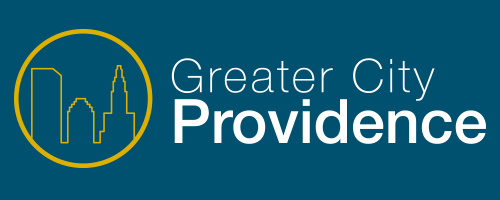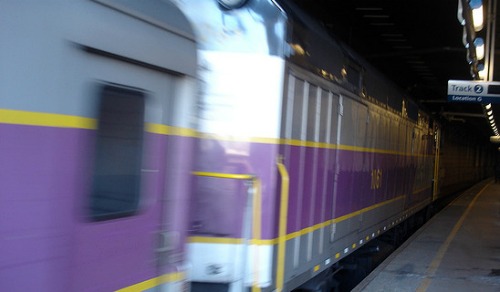MBTA Commuter Rail train at Providence Station. Photo (cc) willismonroe
If the MBTA’s proposals for fare increases and service cuts [.pdf] come to pass, we could be not seeing trains after 10pm or on weekends at Providence Station, or any commuter rail station for that matter. For the remaining trains that continue running, the one-way fare may raise as high as $11.25 from the current $7.75.
While service frequency to T.F. Green was just increased and the train station at Wickford Junction is set to open this spring, the MBTA is facing a monster deficit of $161 million. The deficit was $185 million before the agency knocked $24 million out of it through “efficiencies and savings in energy, operations, health care.” Also, while it is down slightly from 2010 to 2011, non-fare revenue is generally up over the last decade. That leaves fare increases and service cuts as the current last resort for closing the deficit.
The T also faced a $160 million deficit in 2009, state funds were found to cover that deficit before similar service cuts and fare increases were enacted.
The thing is, the Commonwealth saddled the MBTA with this debt after the Big Dig, as The Walking Bostonian points out:
In 2000, in an attempt to fix the finances of the MBTA, legislation called “Forward Funding” was passed. This law dedicated 20% of sales tax revenue to the MBTA, and in exchange, charged the agency with issuing and paying its own debt. People were assured that this would be sufficient to run operations. However, the legislature also did something sneaky: they moved $3.3 billion of debt from the State onto the books of the MBTA. Part of that debt was from the Big Dig. The reformed agency was “[Re-]Born Broke:”
Read more about the impossible situation the T finds itself in, BORN BROKE: How the MBTA found itself with too much debt, the corrosive effects of this debt, and a comparison of the T’s deficit to its peers. [.pdf]
Meanwhile, what do we do about the current crisis, the MBTA has a page about the proposed service reductions and fare increases. The page has various documents about the proposals and a list of public meeting locations (the closest to Providence being in Attleboro on January 24th at 4:30pm).
You can also comment in writing at:
- Email: fareproposal@mbta.com
- Mail:
Fare Proposal
10 Park Plaza, Suite 3910
Boston, MA 02116




I still remember when you couldn’t get MBTA service in Providence. It was a major embarrassment for RI.
And cutting off weekend service will bite Boston in the ass.
Oh and I should mention the RIDE service. That has been an enormous drain on RIPTA and I imagine it’s a heavy drain on the MBTA too.
Part of it is the reduction in federal operating cash for transit agencies. I do wish they’d restore that funding because I’m getting tired of the games being played to try to balance the budgets of transit authorities.
Even with a public meeting in Attleboro, there may be little Rhode Island can do about stopping service decreases to Boston, unless the General Assembly writes a check, which is not very likely.
Wasn’t federal money used for Rhode Island to purchase of equipment (trains) for internal Rhode Island commuter rail service?
Did Rhode Island pay for or towards the equipment costs used for Boston bound service, and did the State pay for the MBTA service/storage yard in Providence/Pawtucket?
RI does have an agreement with MA called the Pilgrim Partnership that outlines service and costs that RI pays for getting MBTA commuter rail service, including the construction of the (completed) layover facility in Pawtucket and the purchase of rolling stock (also completed I believe). The Providence line is the busiest in the system and since the MBTA has a “guaranteed” revenue stream from the State of RI on top of that, I’d say we have the best chance of seeing the fewest cuts, but you never know.
Do all of these increases just keep the status quo as far as maintaining the aging existing equipment or does it allow for any innovation like higher speed trains, electrifying the Providence line etc.?
Status quo, or less.
Another thing to note is the pre-tax program for buying commuter passes took a hit this year as well. The monthly pre-tax allowance for taking public transportation to and from work has dropped from $230 to $125. If you drive and park you get a slightly bigger allowance this year $240 up from $230. My next guess is you’ll need to fill out a credit worthiness application for a monthly pass.
I finally got a job in September where I can commute by train, something I’ve been waiting a long time for… and now we have massive service cuts & reduction of commuter tax benefits.
I still don’t get how the MBTA doesn’t have enough funding – between the amount they charge for fares and the number of people I see packed onto the trains between 6:30 – 9 am and 5 – 10 pm (I’ve been on trains throughout all these times), they should have complimentary cocktail service and an expanded schedule. Am I mistaken that Amtrak pays for the upkeep of the tracks on the Northeast Corridor, so MBTA doesn’t even have to worry about that?
I will be genuinely pissed off if they get rid of 12-ride tickets – they don’t even come with a discount, it’s just the convenience of not having to buy a ticket EVERY DAY. I only take the train 2-4 times a week, so the monthly pass doesn’t make sense for me.
Finally, how frustrating is it to urban-minded people in this country that the IRS reduced the pre-tax amount we can take out for commuting?? Let’s discourage everyone from using public transit, but we’ll increase the amount for parking – so everyone can feel better about driving now – awesome! What is this, 1995?
Boston.com: MBTA Advisory Board proposes 25 percent fare hike, alternatives to steep service cuts
Boston Metro: MBTA Advisory Board offers outside aid, surcharges as alternative to drastic T cuts
Lowell Sun: MBTA woes fuel I-93 border-toll talk?
Boston.com: Top official favors fare hike over service cut
I think it may be worthwhile for those concerned with MBTA service to attend the Feb 27 Providence hearing even though we can’t do much about finding the funding to cover the deficit. I would suggest trying to get more revenue-paying passengers, especially on (reverse) commutes to Providence, if local employers including the State of Rhode Island that give free parking would level the field a bit by also offerring transit incentives, especially as commuter service is to expand southward.
Interesting that MA is also considering intersate tolling, perhaps it adds to pressure in Congress to relax the restrictions. Congress has not raised the Federal gas tax, 18.4 cents, since 1993, and states have a hard time doing so due to border competition, so the Feds ought to allow it more easily in order to finance transportation. ME, NH, NY, NJ, DE, MD, VA all have tolls on I-95 so I don’t see why RI, MA could not. Also, it should be possible to raise the gas tax on a regional basis if states would cooperate, otherwise they all have the same problem of deteriorating infrastructure and threats to transit.
One of the fare proposals currently being tossed about is increasing commuter rail fare at night and on weekends (i.e. non-commuter hours). The increased fare would subsidize the non-commuting services. Would people being willing to pay more for night/weekend commuter rail? How much more? How much would be too much?
Also, would $5 gas change the upper limit of what people are willing to pay?
Brown Daily Herald: At forum, residents criticize MBTA cuts
WPRI: RIDOT holds meeting on MBTA proposals
RIDOT holds meeting on MBTA proposals: wpri.com
I attended the hearing and was part of the group trying to find alternatives to the big fare increase/service cuts being proposed.
Perhaps the best comment was from the representative of the RI Association of Railraod Passengers who pointed out that the Boston-Rhode Island commuter line has the highest ridership and best cost-recovery on the MBTA commuter rail system. Yet the MBTA is proposing across the board cuts equally on all lines. The MBTA spokesperson replied that it was a good point and the MBTA Board well may consder selective cuts, presumably less severe for our lines.
I suggested consideration of a comprehensive deficit reduction plan where everyone involved contributes: a modest fare increase for passengers; concessions by MBTA employees to reduce costs; better promotion from all involved to increase fare revenue (especially on “reverse” commutes to Providence which has a lot of additional capacity – though this will require employer cooperation, for example by the State of Rhode Island whose employees currently all get “free” parking and no transit incentives); and from taxpayers, for which regional cooperation is needed to avoid one state being at a competitive disadvantage
if they lone raise the gas (or some other) tax and yet not just the MBTA, but RIPTA and our roads and bridges are all sufferring from inadequate revenue for transportation.